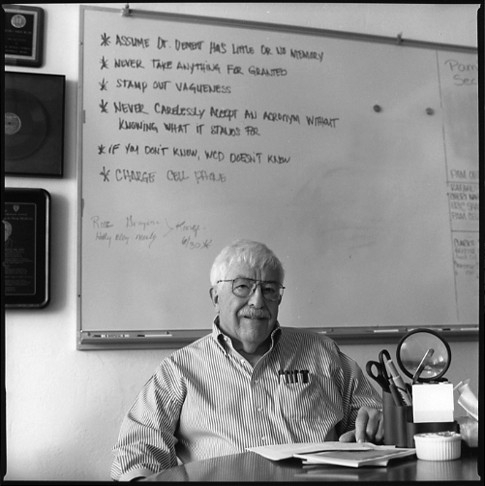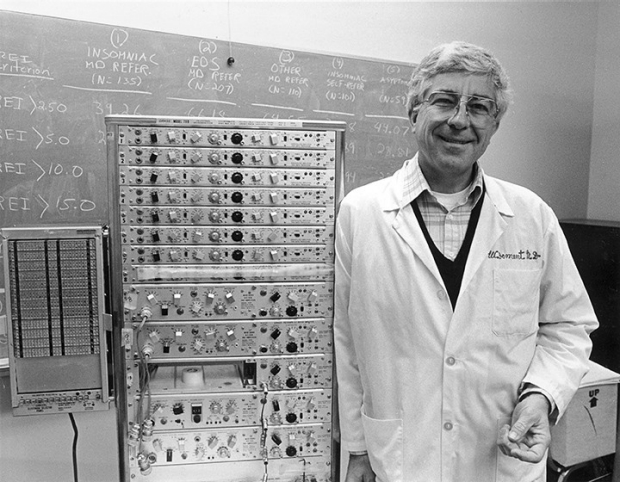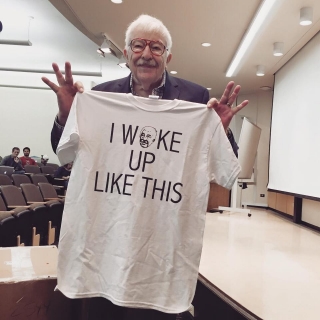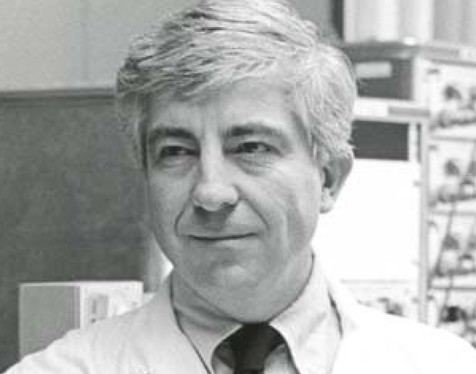THE PROMISE OF SLEEP
Dr William Dement, widely referred to as ‘the father of sleep medicine’ died on June 17 in Stanford California’ aged 91. His mission was to educate the world about the importance of sleep, with his early motto being ‘drowsiness is red alert’. His story still has resonance today, and having been there for some of his journey, I am pleased to tell part of it.
Born in 1928 in Washington State and after post war military service in Japan, in 1951 he gained a bachelor degree in basic medical science at the University of Washington. He then moved to the University of Chicago to study medicine. In his own words ‘I, like about one half of my medical school classmates, wanted to be a psychiatrist, to understand consciousness. If we determine what brain functions are lost when we move from wakefulness to sleep then we can understand what is required for us to be conscious’. Nathanial Kleitman was there at Chicago with the only lab in the world devoted to sleep. After an undergraduate lecture from him, Bill Dement approached Kleitman about doing research and was told to read his 1939 ‘Sleep and Wakefulness’, at which point he believes he knew more about sleep than anyone else but Kleitman!
Because Kleitman read everything about sleep, he had been made aware by Italians of eye movements in sleep [which were probably the slow rolling variety] and asked his research student Eugene Aserinsky to record sleeping infants, then adults, and discovered rapid eye movements. The aspiring psychoanalyst Dement was told ‘we think these rapid eye movements might be related to dreaming’. Bill Dement went on to study this [J Experimental Psychology] as part of his PhD in neurophysiology awarded in 1957, two years after his MD.
To save paper in those more frugal times, all-night recordings were not usual and it was only by accident that continuous recording happened one night and the 90 minute cycling of REM was discovered. Dr Dement even studied cats, to find the same phenomenon, though that paper was rejected five times the reviewers saying ‘this can’t be the recording of a cat asleep; it is obviously awake’!
He also recorded Peter Tripp’s recovery sleep after eight days and eight hours without sleep while still broadcasting from a glass booth in New York’s Time Square, at the end of which Tripp had become paranoid and was hallucinating [perhaps related to his use of Ritalin to keep him awake doing those days?] and found REM rebound and the enduring question with which we still battle, why REM; another legacy.
Bill Dement moved to Stanford in 1963 and having had one narcoleptic patient in New York, searched for more in California with none being identified until he put an advertisement in the San Francisco Chronicle to which he got 100 responses, with half of the respondents being very probable narcoleptic. None had been diagnosed and this opened his eyes to medicine’s blindness to sleep disorders. In 1964 he opened a Narcolepsy Clinic and, ultimately, in 1970 a General Sleep Disorders Clinic, because of the recognition by then that some ‘narcoleptics’ actually had obstructive sleep apnoea. The conditions that arise from abnormal sleep are a core element in the increased knowledge of sleep. Primary sleep disorders such as insomnia, narcolepsy, and obstructive sleep apnoea are the reason sleep-specific research was made easier to perform with Bill Dement at the fore.
He achieved his mission, and along the way
elucidated phases of the human sleep cycle, establishing the National Commission on Sleep Disorders Research with its’ subsequent NIH funding, establishing the American Sleep Disorders Association in 1975 [which became the American Academy of Sleep Medicine] and was its president for 12 years, while at the same time driving standards and a diagnostic classification system with examinations for Certification first held in 1977 [he signed his own certificate, and mine in 1980!]. He created the journal Sleep with Christian Guilleminault and, of course, was Editor of The Principles and Practice of Sleep Medicine, with Meir Kryger and Tom Roth.
Bill Dement’s motto ‘drowsiness is red alert’ led him into the public health arena with the drive to make sleep deprivation a public-health priority, recognizing the higher risk of sleep related road traffic accidents, reduced workplace productivity, increased mistakes and, indeed, irritability. He became Chair of the Federal Commission on Sleep Disorders, visiting scores of Sleep Centers, mine at UCLA included, reporting in 1992 that 40 million Americans had undiagnosed chronic sleep problems. This led to the creation in 1993 of a National Centre on Sleep Disorders Research within the NIH. But even with this he believed that Government’s response was inadequate, ‘with a lack of awareness so pervasive, victims not knowing what is wrong with them and doctors not asking. There were no masses of enlightened victims and no faculty positions at universities and no way to break into the medical school curriculum’- sounds familiar.
His close colleague Emmanuel Mignot said ‘Just by pushing this field forward, making sleep apnoea recognized, as well as sleep deprivation, Bill saved the lives of hundreds of thousands of people. Without him it would still have happened, but maybe 10 years later. 10 years is a lot of deaths.’
Dr William Dement was a pioneer in sleep medicine to whom we owe a debt and which we can repay by continuing to advocate for increased recognition of sleep, along with exercise and diet, as one of the three pillars of health, and perhaps the most important.
Professor Adrian Williams
King’s College London
London 8th July 2020





